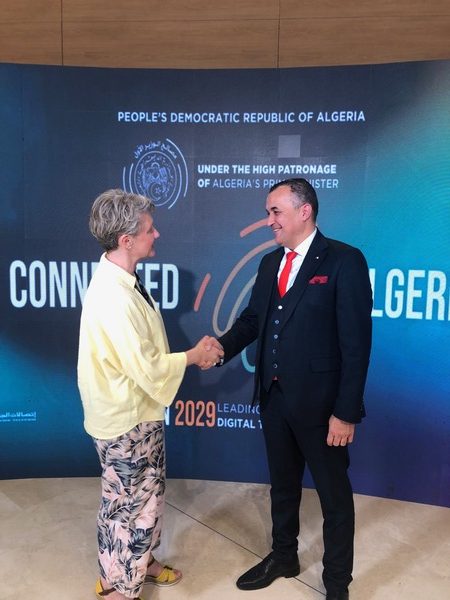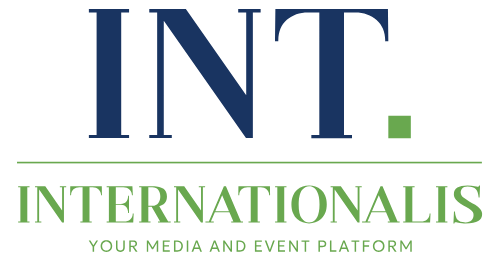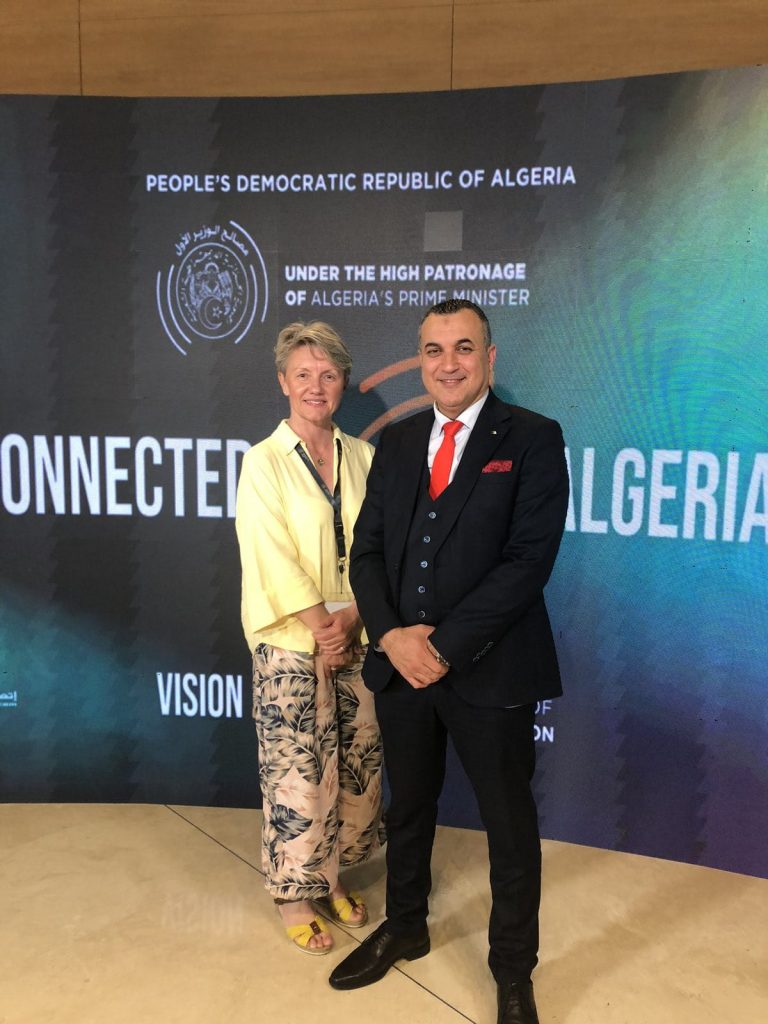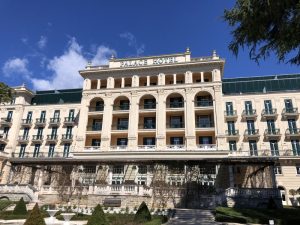Algeria aims to become a regional leader in the digital transformation
By 2029, Algeria aims to become a regional leader in the digital transformation, fostering an ecosystem where technology drives economic growth.
The Conference Connected Algeria 2025, held in the first week of April, marked the beginning of something greater. A space where vision met innovation, and bold ideas sparked real change. Where conversations didn’t just echo, they built the future. The motto of the conference, organized by Algérie Telecom, was “To a brighter connected future!
On the occasion of the Connected Algeria Conference, Internationalis had the exclusive opportunity to interview Mr. Sid Ali Zerrouki, Minister of Post and Telecommunications of Algeria.

- How would you describe Algeria’s position in the current digital expansion right now?
Great question. First of all, thank you for attending the Connected Algeria Conference and for the Slovenian experts who support us and participate in the workshops and lectures, where they added value. This is the first thing!
Secondly, having in mind my professional background, I should say that I’ve been around in Africa, in the world, roaming in 35 countries, working in telecommunication for the past two decades, so my career gave me a big picture of the landscape.
“265,000 kilometres of fibre-optic spread in a country that represents 8% of the African continent.”
And proudly, I can say that in terms of infrastructure, we have done a lot. The government of Algeria has spent a lot of money building infrastructure. I’ll just give you some figures: There are at least 265,000 kilometres of fibre optics spread in a country that represents 8% of the African continent. So, it’s a massive investment.
“Minister Sid Ali Zerrouki clarifies the launch of 5G at the El Moudjahid Forum. The tender document will be ready in two weeks. At a forum held in Algiers, the Minister of Post and Telecommunications, Sid Ali Zerrouki, announced that the specifications for 5G will be ready in two weeks. He insisted on considering deploying this technology, stressing that Algeria is not behind and that 5G must serve strategic fields such as agriculture, medicine, or industry 4.0, and not classic web uses. He also highlighted the guarantees provided for data protection and measures against cyberattacks. In addition, the Minister affirmed that the rollout of fibre optics will reach 100% of the national territory by 2027, with 265,000 km already installed.
Source: Algeria Invest, April 24, 2025
https://algeriainvest.com/en/premium-news/lancement-de-la-5g-les-clarifications-de-sid-ali-zerrouki
Since I took position after being appointed by the President of the Republic, Abdelmadjid Tebboune, as Minister of Post and Telecommunication, I started visiting some cities, doing some inspection, and I was every time proud of what has been done by the government. What I see at the extreme edge of the country, in, for example, Adrar, Tamanrasset, at the very edge, we have fibre optic reaching houses. That’s amazing. That is progress. Electricity, roads, paved roads. So, that means there is no digital gap, and people have the same digital conditions. No difference between a citizen of Algeria who lives in the North, East, West, or one who is at the extreme South, Southeast, Southwest of Algeria. So, this shows not only how big the country is, but how much the government has spent to provide equal access to all infrastructure, all technology everywhere. This is the first thing.
“Algeria also has an educational elite and many talented scholars. “
The second thing is Algerian human capital and resources. I’m not sure if you are aware that we in Algeria have 10 universities and institutes. And each year, we have approximately 250, sometimes it’s up to 280,000 graduates. More than 45% are engineers. And we have a University for AI. It’s a High Institute for AI, a high institute for mathematics, robotics, and cybersecurity, alongside other universities specialized in telecommunication, mathematics. So, Algeria also has an educational elite and many talented scholars.
“Algeria aspires to be the regional digital hub.”
Why does Algeria aspire to be the regional hub? First, the geographical position of the country. Actually, between Algiers and Slovenia, there is a one-and-a-half-hour flight. From here to London, from here to Madrid, to Rome, it’s more or less the same. That means that we are connected nationally to a “backbone” and a submarine cable to the world.
So, we have infrastructure, we have engineers, and we have the lowest electricity cost and price almost worldwide. In the continent, we have electricity everywhere. The infrastructure is there. Human capital is there. The government that is willing is there. Investment is ongoing with the guidance of the president of the Republic, who first saw the future when he launched four and a half years ago those Institutes for cybersecurity, AI, and mathematics, because he has a vision. At that time, when we go back to 2020 or 2021, AI was still not yet, so to say “mature”. But the President was visionary and said: “We have to have this university, and it was there. Four and a half years ago. Yes!
“Exciting times for the country. Everything is taking place at the same time.”
Well, the digital puzzle started to be built a while ago. Now it’s also a question of the momentum. Now, when you talk about AI, nobody is surprised because we heard about it a while ago. Even before ChatGPT took the lead, Algeria had a university for AI which was formed four and a half years ago.
Are the Algerians, everyday people, are they ready for digitalization?
Of course. We are embracing digitalization in our daily tasks. Of course, there are a lot of platforms. There are a lot of solutions that are there. Maybe some Algerians still do things in the “analogue way”, while they have, possibility to do it digitally. Right? And, of course, when we embrace new technology, a new trend, you have to go smoothly. You cannot push people. No. But, it’s so practical. I guess everybody, when they start using more digital tools, when they have a positive digital experience, will make this shift. We can see that the digital trend is on the rise, and the pace is fast. Many people say that we are a bit late, and I say no. Rest assured, especially for the 5G. Many countries in Europe, in the US, and in Asia that launched 5G back in 2019, 2020, and did not enjoy the 5G, since at that time, the equipment was too expensive. And user case was too small. Then there was plenty. But now, since last year, user cases are various. We have a lot of user cases for 5 G. Now, vendors are monetizing the 5 G user cases for operators. That means they support them to generate more revenue. Now, they invest less to get more. Five years ago, or six years ago, they invested too much for less revenue. In some countries, they stopped investing in 5 G because they couldn’t get the benefit. So many people come to me, they say, ah, we are late. I said, no. Look! It’s the right moment.
Tell us about Vision 2029, what has been achieved so far? What is in the pipeline?
In fact, once again, it is a project that was part of the vision of the President of the Republic, who put in place the High Commission for digitalization and a national strategy for digitalization. The government has put in place mechanisms that make data accessible, of course, based on certain metrics of responsibility and the credentials, deciding which data, and how to use it.
This first thing, which is ongoing, has a deadline given, on April 7th at the Ministerial summit, a meeting headed by the President, and it was decided to finalize the mentioned project by the end of the year.
Now we are also investing. We announced, a month ago, the creation of a fund for AI, dedicated just to AI, and there will be data centres countrywide for AI.
Also, there are a lot of students who have graduated maybe four or five years ago. For them, we created skill centres to train them, free of charge, to get the new knowledge about cybersecurity, AI, best practice, ethics, ICT. This will allow us to bring in those who studied before the establishment of the AI Institute.
The vision is to put in place about 20,000 startups within the next couple of years. Today, the ecosystem for startups has reached a certain level. Six years ago, nobody heard about startups in the country. But for the past four years, Algerian startups have been “shining” as well. The ecosystem has become brilliant. We see a scale-up. We see Unicorn from Algeria, other startups that are doing amazing as well in Europe, in the US, in Asia, supported by the government. Delegations are being sent, and there is one of them that might be visiting Slovenia very soon. Delegation of startups to exchange know-how to see new market business and a new revenue stream for excellence.
Read more about Mr. Sid Ali Zerrouki, Minister of Post and Telecommunications of Algeria
Connected Algeria Conference hosted among many excellent guests two Slovenian experts, i.e. Luka Čehovin Zajc, assistant professor at the Visual Cognitive Systems Lab at Faculty of Computer and Information Science, University of Ljubljana, and Marko Grobelnik, AI Researcher & Digital Champion of Slovenia at EC.





